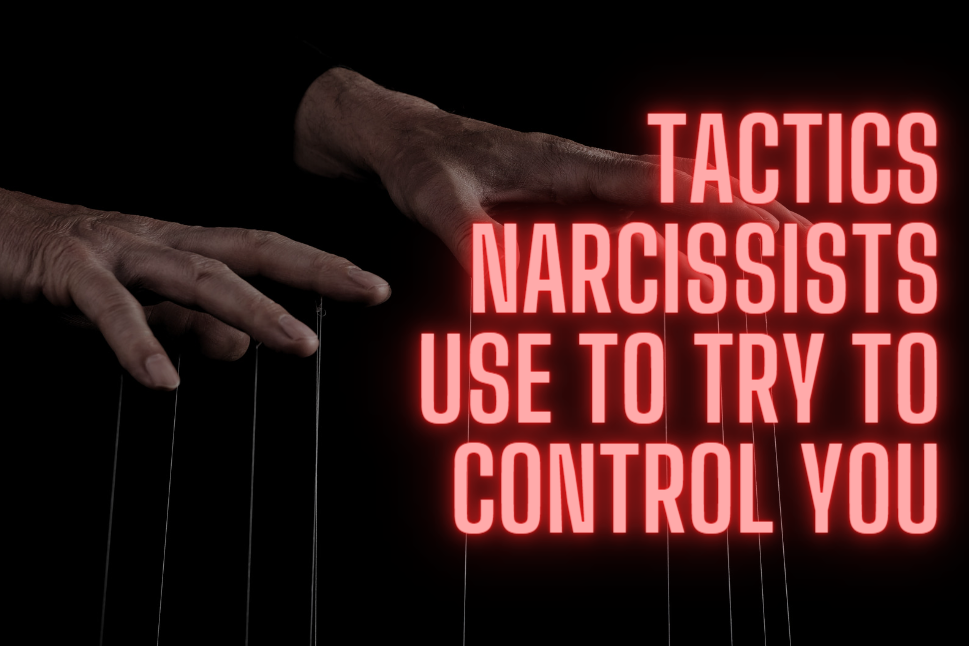
I. Introduction
Narcissism, a personality trait characterized by excessive self-admiration and a lack of empathy for others, can manifest itself in various forms and degrees of intensity. It is crucial to recognize narcissistic behavior in relationships, as it can be detrimental to one’s emotional well-being. Individuals with narcissistic tendencies often employ a range of manipulative tactics to exert control over others, undermining their confidence and autonomy. This blog article aims to explore ten common ways a narcissist may try to control you and provide eight strategies for protecting yourself from such manipulation. By understanding these tactics and implementing self-protection measures, you can better safeguard your emotional health and cultivate healthier relationships.
II. 10 Ways a Narcissist Can Try to Control You
A. Love bombing
Love bombing is an intense, overwhelming display of affection and attention, often at the beginning of a relationship. Narcissists use this tactic to quickly win over their target, making them feel special and cherished. They may shower their partner with compliments, gifts, and constant communication to create a sense of emotional dependency. Once the target is hooked, the narcissist may suddenly withdraw or reduce this affection, leaving their partner confused and craving the initial level of attention. This cycle can create a powerful bond, making it challenging for the target to recognize the narcissist’s controlling nature and manipulative intentions.
B. Gaslighting
Gaslighting is a deceptive tactic used by narcissists to sow doubt and confusion in their target’s mind. By questioning your memory, perception, or judgment, they make you feel unsure of your own reality. They might deny ever having said or done something, dismiss your feelings as irrational, or twist facts to support their narrative. Over time, gaslighting can erode your self-confidence, making you more susceptible to the narcissist’s control. You may begin to question your own sanity and rely on the narcissist’s version of events, allowing them to manipulate and dominate the relationship.
C. Playing the victim
Narcissists are adept at portraying themselves as victims in order to manipulate and control others. They may exaggerate or fabricate personal hardships, feigning vulnerability to evoke sympathy and support. By playing the victim, they can deflect responsibility for their actions, shift blame onto others, and justify their own toxic behavior. This tactic can be particularly effective when the narcissist has caused emotional distress to their partner, as it redirects the focus from their own misdeeds to their alleged suffering. This manipulative strategy can leave you feeling guilty, responsible for their well-being, and more likely to tolerate their controlling behavior.
D. The silent treatment
The silent treatment is a passive-aggressive form of emotional manipulation often used by narcissists to punish or control their partners. They may ignore your messages, refuse to engage in conversation, or withhold affection to create a sense of emotional abandonment. This tactic can be incredibly damaging, as it leaves you feeling rejected, anxious, and desperate for a resolution. Narcissists leverage the silent treatment to assert their dominance and elicit an apology or compliance, even when they are the ones at fault. It can also condition you to walk on eggshells, fearing that any disagreement or perceived slight could trigger another episode of silence.
E. Triangulation
Triangulation is a manipulative technique in which a narcissist creates a love triangle by involving a third party in the relationship. This could be an ex-partner, a friend, or even a family member. The narcissist may compare you to this person, often unfavorably, to provoke feelings of insecurity and jealousy. They might also confide in this third party about your relationship, encouraging them to take sides and further inflaming the conflict.
The purpose of triangulation is to establish control by undermining your confidence, fostering competition, and creating an environment in which you feel the need to constantly prove your worth. This tactic can also serve to isolate you from your support network, as the narcissist turns others against you, further consolidating their control.
F. Constant criticism
Narcissists often use constant criticism as a means of control, targeting their partner’s self-esteem and self-worth. They may belittle your accomplishments, dismiss your opinions, or mock your appearance to erode your confidence. This persistent negativity can make you feel inadequate and more reliant on the narcissist for validation and support.
It is important to remember that the narcissist’s criticism often stems from their own insecurities and desire for control, rather than any genuine concern or constructive feedback. By keeping you in a state of self-doubt, the narcissist can maintain their position of power and ensure that you remain vulnerable to their manipulation.
G. Manipulation through guilt
Narcissists are skilled at using guilt as a tool for manipulation and control. They may twist situations to make you feel responsible for their emotions or problems, even when their distress is the result of their own actions. By making you feel guilty, the narcissist can elicit compliance and ensure that you prioritize their needs above your own.
This tactic can be particularly effective when the narcissist plays the victim, as it reinforces the idea that you are the one causing their suffering. Over time, this manipulation through guilt can create a cycle of emotional abuse, where you constantly feel obligated to make amends and cater to the narcissist’s demands, further entrenching their control over you.
H. Controlling your time and resources
In an attempt to establish control, a narcissist may seek to dominate your time, finances, and personal resources. They might insist on being involved in every aspect of your life, from your social engagements to your daily routine. This can lead to a sense of suffocation and a loss of autonomy, as the narcissist monopolizes your attention and prevents you from pursuing your own interests or maintaining other relationships.
Financial control is another common method used by narcissists to maintain power. They may try to control your spending, limit your access to shared funds, or even pressure you into financial dependency. By controlling your resources, the narcissist can limit your options and make it more difficult for you to leave the relationship or challenge their authority.
I. Smear campaigns
When a narcissist feels threatened or fears losing control, they may resort to launching a smear campaign against you. This involves spreading false or exaggerated rumors about your character, behavior, or intentions to damage your reputation and relationships. By discrediting you, the narcissist aims to isolate you from your support network and make it more difficult for you to challenge their narrative or seek help.
Smear campaigns can be incredibly damaging, as they often involve character assassination and public humiliation. They serve to reinforce the narcissist’s control over you, as you may feel trapped and powerless to defend yourself against the onslaught of lies and accusations.
J. Threats and ultimatums
Narcissists may use threats and ultimatums as a means of control, instilling fear and compliance in their partners. These threats can range from emotional manipulation, such as threatening to end the relationship or harm themselves, to more overt forms of intimidation, including physical or financial threats.
By issuing ultimatums, the narcissist forces you into a corner, making you feel as though you have no choice but to comply with their demands. This tactic can be especially effective when combined with other forms of manipulation, such as playing the victim or using guilt. In the face of these threats, you may feel compelled to prioritize the narcissist’s needs and desires above your own, further solidifying their control over the relationship.
III. 8 Ways to Protect Yourself from Narcissistic Control
A. Learn to recognize the signs of narcissistic behavior
Education is a powerful tool in protecting yourself from narcissistic control. By familiarizing yourself with common narcissistic behaviors and tactics, you can better identify warning signs in your relationships. This knowledge allows you to make informed decisions and take action before becoming entangled in a toxic dynamic.
B. Set boundaries and stick to them
Establishing clear boundaries is crucial in maintaining a healthy relationship and protecting yourself from narcissistic manipulation. Communicate your needs and limits openly, and be consistent in enforcing these boundaries. By standing firm, you demonstrate that you will not tolerate being controlled or mistreated.
C. Practice self-care and prioritize your well-being
Taking care of your physical, emotional, and mental well-being is essential in safeguarding yourself against narcissistic control
D. Develop a strong support system
Having a reliable network of friends, family, or support groups can provide valuable emotional and practical support when dealing with a narcissist. Share your experiences with people you trust, and seek their guidance and advice. By maintaining connections with others who care about your well-being, you can counteract the narcissist’s attempts to isolate you and receive the reassurance you need to maintain your resilience.
E. Limit contact and communication when possible
If you are able to do so, consider limiting your contact and communication with the narcissist. This may involve setting boundaries on the frequency of communication, avoiding certain topics, or even ending the relationship entirely if it is in your best interest. Reducing your exposure to the narcissist’s manipulation can provide you with space to heal and regain your autonomy.
F. Seek professional help, such as therapy or counseling
Working with a mental health professional can be incredibly helpful in addressing the effects of narcissistic abuse and developing strategies for self-protection. Therapists and counselors who specialize in this area can help you process your experiences, rebuild your self-esteem, and establish healthier patterns in your relationships.
G. Focus on personal growth and self-improvement
Investing in your own personal growth and self-improvement can empower you to resist narcissistic control. By developing your self-awareness, confidence, and emotional resilience, you become less vulnerable to manipulation and more capable of asserting your needs in relationships.
Remember that you cannot change the narcissist
It is crucial to accept that you cannot change the behavior or attitudes of a narcissist, no matter how much you care for them or how hard you try. Focusing on your own well-being and setting boundaries is the most effective way to protect yourself from their manipulation. By prioritizing your own emotional health, you can cultivate healthier, more fulfilling relationships.
Recognizing and understanding the tactics narcissists use to control others is crucial in safeguarding your emotional well-being and maintaining healthy relationships. By being aware of these manipulative strategies, setting firm boundaries, and prioritizing your self-care, you can protect yourself from narcissistic control and foster more positive, respectful connections. Remember that you deserve to be treated with dignity and kindness, and trust your instincts when navigating relationships. By focusing on your own growth and surrounding yourself with a supportive network, you can build a foundation of resilience and self-assurance, empowering you to thrive in the face of adversity.




